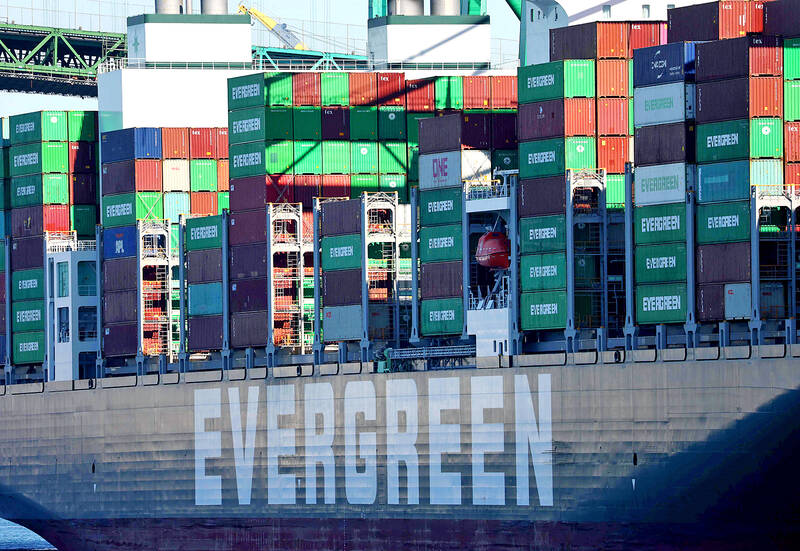Taiwanese container shipping line Evergreen Marine Corp (長榮海運) has declared force majeure on a shipment to the Israeli port of Ashdod, with its Ever Cozy vessel diverted to Haifa due to safety concerns, a customer note said.
This is one of the first force majeures declared since Hamas launched attacks on Israel on Oct. 7 and amid preparations by Israel’s military to launch ground operations into Gaza in retaliation.
The Ever Cozy on Tuesday was sailing toward Haifa, data from ship tracking and maritime analytics provider MarineTraffic showed.

Photo: AFP
While the smaller Ashkelon port, which is the closest terminal to Gaza, has shut, Ashdod has remained opened with restrictions on the transport of hazardous goods, including flammable and explosive materials.
In a note to customers dated Monday, Evergreen said that it was informed about the “persisting unsafe situation” at Ashdod port since Oct. 7.
“As the situation is beyond Evergreen Line’s control, we are formally declaring force majeure,” the advisory said. “All cargoes which were originally destined for Ashdod, Israel, will be discharged at Port of Haifa, Israel. Thereafter, the subject contract of carriage is treated as terminated and all carrier’s responsibilities shall cease.”
In the latest update, Ashdod port said on its Web site that employees continued to work “at a time when the port is operating with constant siren alerts for incoming missiles.”
On Tuesday, three ships, including an oil tanker, remained at anchor waiting to enter Ashdod, while 16 ships were anchored near Haifa, the MarineTraffic data showed.
Ashdod and Haifa are vital goods gateways for Israel.
War risk insurance rates have soared more than 10-fold in the past few days to Israeli ports with growing concerns over an escalation in hostilities.

Macronix International Co (旺宏), the world’s biggest NOR flash memory supplier, yesterday said it would spend NT$22 billion (US$699.1 million) on capacity expansion this year to increase its production of mid-to-low-density memory chips as the world’s major memorychip suppliers are phasing out the market. The company said its planned capital expenditures are about 11 times higher than the NT$1.8 billion it spent on new facilities and equipment last year. A majority of this year’s outlay would be allocated to step up capacity of multi-level cell (MLC) NAND flash memory chips, which are used in embedded multimedia cards (eMMC), a managed

In Italy’s storied gold-making hubs, jewelers are reworking their designs to trim gold content as they race to blunt the effect of record prices and appeal to shoppers watching their budgets. Gold prices hit a record high on Thursday, surging near US$5,600 an ounce, more than double a year ago as geopolitical concerns and jitters over trade pushed investors toward the safe-haven asset. The rally is putting undue pressure on small artisans as they face mounting demands from customers, including international brands, to produce cheaper items, from signature pieces to wedding rings, according to interviews with four independent jewelers in Italy’s main

CULPRITS: Factors that affected the slip included falling global crude oil prices, wait-and-see consumer attitudes due to US tariffs and a different Lunar New Year holiday schedule Taiwan’s retail sales ended a nine-year growth streak last year, slipping 0.2 percent from a year earlier as uncertainty over US tariff policies affected demand for durable goods, data released on Friday by the Ministry of Economic Affairs showed. Last year’s retail sales totaled NT$4.84 trillion (US$153.27 billion), down about NT$9.5 billion, or 0.2 percent, from 2024. Despite the decline, the figure was still the second-highest annual sales total on record. Ministry statistics department deputy head Chen Yu-fang (陳玉芳) said sales of cars, motorcycles and related products, which accounted for 17.4 percent of total retail rales last year, fell NT$68.1 billion, or

In the wake of strong global demand for AI applications, Taiwan’s export-oriented economy accelerated with the composite index of economic indicators flashing the first “red” light in December for one year, indicating the economy is in booming mode, the National Development Council (NDC) said yesterday. Moreover, the index of leading indicators, which gauges the potential state of the economy over the next six months, also moved higher in December amid growing optimism over the outlook, the NDC said. In December, the index of economic indicators rose one point from a month earlier to 38, at the lower end of the “red” light.